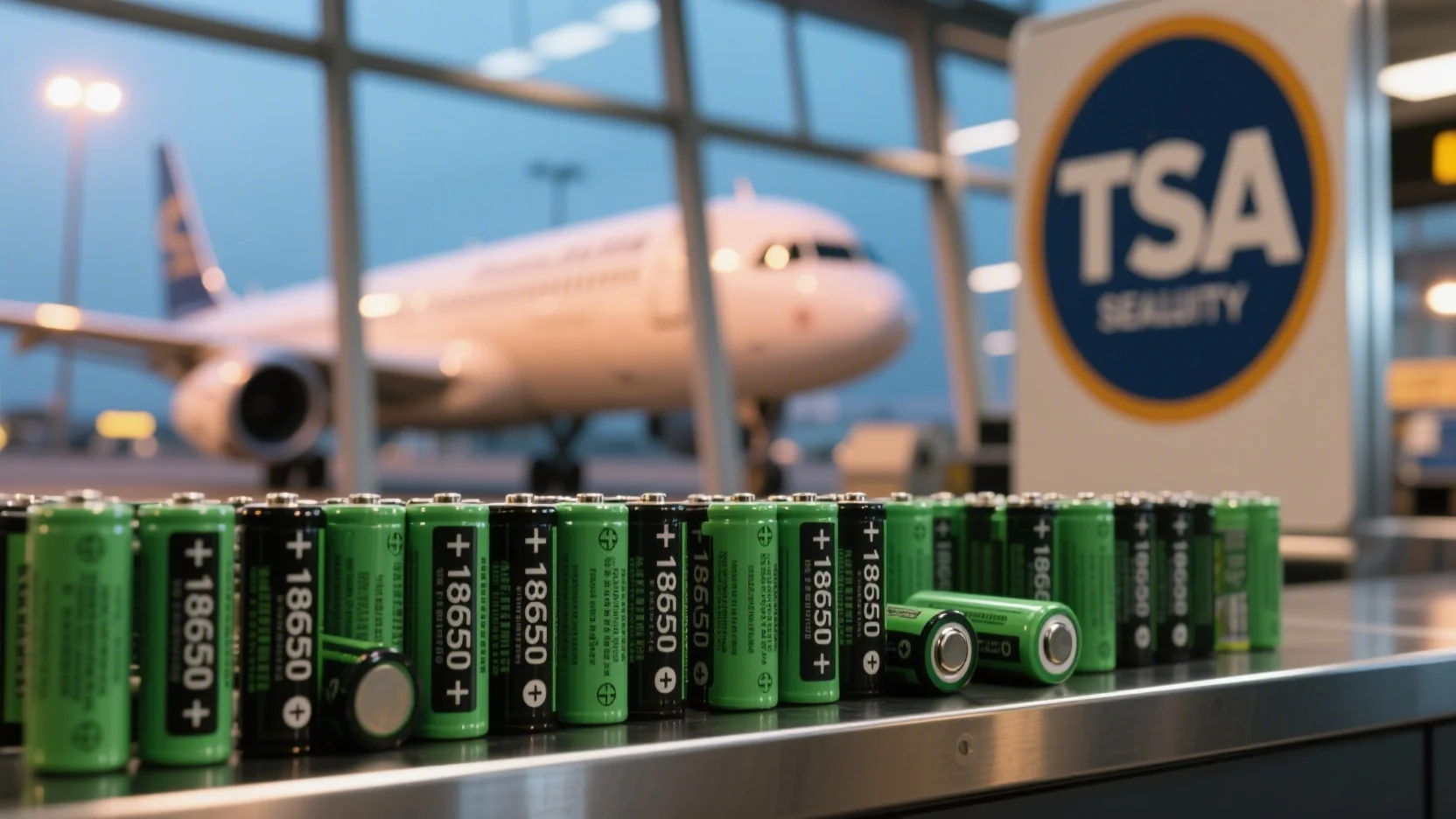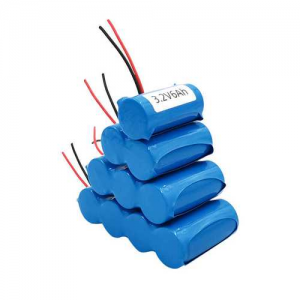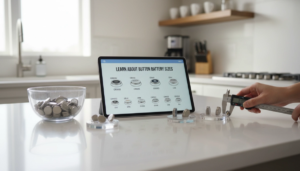Hai in programma un viaggio e ti chiedi se puoi portare le tue batterie 18650 sull'aereo? Sono passato anch'io da lì.
Come qualcuno che viaggia con attrezzature fotografiche e torce che usano batterie 18650, ho dovuto affrontare queste regole più volte. Le batterie 18650 sono consentite sui voli? La risposta breve è sì, ma ci sono alcune restrizioni fondamentali di cui devi essere a conoscenza.
In questa guida completa, come professionista batteria 18650 produttore, spiegherò tutto ciò che devi sapere sul volo con batterie al litio 18650 nel 2025. Imparerai le regole esatte, come imballarle in modo sicuro e come evitare problemi alla sicurezza.
Iniziamo.

Cosa sono le batterie 18650?
Prima di andare troppo avanti, chiarifichiamo cosa sono realmente queste batterie.
Le batterie 18650 sono celle ricaricabili al litio che misurano 18mm di diametro e 65mm di lunghezza (da qui il nome “18650”). Hanno tipicamente una tensione di 3,7V e una capacità che varia da 1800mAh a 3500mAh.
Troverai queste potenze cilindriche in una varietà di dispositivi:
-
Torce e lampade frontali ad alta potenza
-
Batterie per laptop
-
Power bank e caricabatterie portatili
-
Biciclette elettriche e scooter
-
Dispositivi per svapare
-
Progetti di elettronica fai-da-te
La loro popolarità deriva dalla loro alta densità energetica e affidabilità. Ma queste stesse proprietà le rendono anche un potenziale problema di sicurezza per i viaggi aerei.
Le batterie 18650 sono consentite sugli aerei
La risposta breve: Sì, ma con restrizioni importanti. La regola più importante? Le batterie 18650 di scorta devono essere solo nel bagaglio a mano. Sono severamente vietate nel bagaglio registrato.
Perché questa distinzione? Se una batteria dovesse cortocircuitarsi o surriscaldarsi nel bagagliaio, l'equipaggio di volo non potrebbe accedervi per gestire la situazione. In cabina, eventuali problemi possono essere affrontati immediatamente.
Ma c’è di più da sapere oltre questa regola di base.
Regolamenti ufficiali dell'aviazione per le batterie 18650
Vediamo cosa dicono le regole ufficiali sul viaggio con batterie al litio come le 18650.
Linee guida FAA e TSA
Secondo le linee guida della Federal Aviation Administration (FAA) aggiornate al 2025:
-
Le batterie al litio-ione (come le 18650) con 100 watt-ora (Wh) o meno possono essere portate nel bagaglio a mano
-
Le batterie di scorta NON devono MAI essere nel bagaglio registrato
-
I terminali devono essere protetti per prevenire cortocircuiti
-
Le batterie installate nei dispositivi possono essere portate sia nel bagaglio a mano che in quello da stiva
Le normative della Transportation Security Administration (TSA) sono allineate con quelle della FAA su questi punti.
Regole dell'International Air Transport Association (IATA)
L'IATA, che fornisce linee guida per i voli internazionali, ha regole molto simili. Le loro Regolamentazioni sui Materiali Pericolosi 2025 affermano:
-
Le batterie agli ioni di litio sotto i 100Wh sono consentite nel bagaglio a mano
-
Ogni persona è limitata a un massimo di 20 batterie di scorta (anche se le compagnie aeree possono approvare di più)
-
Le batterie tra 101-160Wh richiedono l'approvazione della compagnia aerea, con un limite di due batterie di scorta per persona
Calcolo dei Watt-Hora per le tue batterie 18650
Questo è importante: devi conoscere la capacità in watt-ora delle tue batterie.
Ecco la formula semplice:
Watt-ora (Wh) = Tensione (V) × Capacità (Ah)
Per una batteria 18650 standard valutata a 3,7V con capacità di 3500mAh (3,5Ah):
3,7V × 3,5Ah = 12,95Wh
Buone notizie: La maggior parte delle batterie 18650 rientra tra 7-13Wh, ben sotto il limite di 100Wh. Ciò significa che sono generalmente consentite senza permesso speciale.
Bagaglio a mano vs. Bagaglio da stiva: La differenza fondamentale
Capire dove puoi imballare le tue batterie è fondamentale per un viaggio senza problemi.
Regole per il bagaglio a mano
Per il tuo bagaglio a mano:
-
Puoi portare batterie di scorta (non installate) 18650
-
Le batterie devono avere terminali protetti per prevenire cortocircuiti
-
La maggior parte delle compagnie aeree consente più batterie sotto i 100Wh per uso personale
-
Sono inoltre permesse dispositivi con batterie 18650 installate
Come ha riferito un viaggiatore su Reddit: “Puoi portare fino a 20 batterie di riserva nel bagaglio a mano, nessuna delle quali può superare i 100WH purché siano imballate in modo da prevenire cortocircuiti.”
Regole per il bagaglio da stiva
Per il bagaglio da stiva, le regole sono molto più severe:
-
NON sono consentite batterie di riserva o sciolte 18650
-
Dispositivi con batterie installate possono essere inseriti nel bagaglio registrato SE sono completamente spenti
-
Il dispositivo deve essere imballato per prevenire attivazioni accidentali
L’FAA afferma esplicitamente: “Tutte le batterie al litio di riserva e le power bank devono essere rimosse dalla borsa e tenute con il passeggero nella cabina dell’aereo.”
Come imballare correttamente le batterie 18650 per i viaggi aerei
L’imballaggio corretto è essenziale per la sicurezza e la conformità. Ecco come farlo correttamente:
Protezione dei terminali della batteria
Devi impedire che i terminali della batteria tocchino oggetti metallici (che potrebbero causare un cortocircuito). Usa uno di questi metodi:
-
Confezione originale: Mantieni le batterie nella confezione di vendita se possibile
-
Coperture per terminali: Usa cappucci di plastica progettati per batterie 18650
-
Nastro isolante: Copri i terminali positivo e negativo con nastro non conduttivo
-
Custodie per batterie: Conservare in appositi contenitori di plastica per batterie (altamente consigliato)
-
Sacchetti individuali: Inserire ogni batteria in un sacchetto di plastica separato
L’FAA specifica: “I terminali della batteria (di solito le estremità) devono essere protetti dal cortocircuito (cioè, i terminali non devono entrare in contatto con altri metalli).”
Custodie e portabatterie
Consiglio vivamente di investire in una custodia adeguata per batterie. Questi contenitori di plastica:
-
Mantengono le batterie organizzate
-
Offrono un'eccellente protezione dei terminali
-
Rendono facile l'ispezione delle batterie da parte della sicurezza
-
Prevenire che le batterie si muovano all'interno della borsa
Questi casi di solito costano meno di $10 e possono risparmiarti molti problemi alla sicurezza.
Per dispositivi con batterie installate
Se la tua torcia, laptop o altro dispositivo ha batterie 18650 installate:
-
Per il bagaglio a mano: Non è necessario alcun preparativo speciale, ma considera di rimuovere la batteria se è facilmente accessibile
-
Per i bagagli da stiva: Assicurarsi che il dispositivo sia completamente spento (non in modalità di risparmio energetico)
-
Considera di imbottire il dispositivo per prevenire attivazioni accidentali
Consigli pratici da viaggiatori frequenti
Leggendo le esperienze di altri viaggiatori, ho raccolto alcuni consigli pratici:
Strategie per i controlli di sicurezza
-
Sii proattivo: Rimuovi le custodie della batteria dal tuo bagaglio e posizionale nel contenitore di sicurezza
-
Conosci le specifiche della tua batteria: Gli agenti di sicurezza potrebbero chiedere informazioni sulle classificazioni in watt-ora
-
Porta documentazione: Avere l'imballaggio originale o la scheda tecnica può essere utile in caso di interrogatorio
-
Rimani calmo e collaborativo: La sicurezza sta semplicemente facendo il suo lavoro
Un viaggiatore ha notato: “Non ho mai avuto problemi. Sono volato in Montana e ritorno lo scorso fine settimana. Avevo con me 4 torce, tutte con batterie Li-Ion. Più un’altra 18650 e una 21700 in un caricatore PB2S. Tutto nel mio bagaglio a mano. Non mi hanno nemmeno chiesto nulla.”
Considerazioni internazionali
Paesi diversi possono avere interpretazioni leggermente diverse delle regole:
-
I paesi europei seguono generalmente linee guida simili a quelle degli altri paesi
-
Alcuni paesi asiatici potrebbero essere più severi riguardo all'ispezione delle batterie
-
Controlla sempre le politiche specifiche della compagnia aerea per i voli internazionali
Come ha condiviso un viaggiatore internazionale: “Ho viaggiato regolarmente all’interno dell’Europa e dell’Asia con torce e celle 18650 sciolte nel mio bagaglio a mano e non ho mai ricevuto nemmeno un commento a riguardo.”
Domande frequenti sui viaggi con batterie 18650
Affrontiamo alcune domande frequenti:
Quante batterie 18650 posso portare?
La maggior parte delle compagnie aeree segue le linee guida IATA che consentono fino a 20 batterie di riserva sotto i 100Wh per passeggero. Tuttavia, le singole compagnie aeree possono avere politiche proprie, quindi vale la pena verificare con il vettore specifico.
Cosa succede se la sicurezza mette in discussione le mie batterie?
Preparati a spiegare:
-
Quali dispositivi alimentano
-
La loro valutazione in watt-ora (mostrare che sono sotto i 100Wh)
-
Come hai protetto i terminali
Avere l'imballaggio originale o una stampa delle specifiche della batteria può essere utile.
Posso usare power bank con batterie 18650 durante il volo?
Sì, la maggior parte delle compagnie aeree permette l'uso di power bank durante il volo purché siano sotto i 100Wh. Tuttavia, alcuni vettori potrebbero avere restrizioni specifiche contro la ricarica di dispositivi più grandi o l'uso di power bank durante determinate fasi del volo.
E le batterie danneggiate?
Non viaggiare mai con batterie danneggiate, ammaccate o gonfie. Se una batteria si danneggia durante il viaggio, informa immediatamente il personale della compagnia aerea e non cercare di trasportarla ulteriormente.
Considerazioni sulla sicurezza e migliori pratiche
Capire perché esistono queste regole aiuta a sottolinearne l'importanza.
Perché esistono queste restrizioni
Le batterie agli ioni di litio possono subire un processo chiamato “thermal runaway” se danneggiate o cortocircuitate. Questo può portare a incendi o addirittura esplosioni. In un aereo pressurizzato a 35.000 piedi, questa è ovviamente una seria preoccupazione per la sicurezza.
L’FAA osserva che “Le batterie agli ioni di litio devono sottoporsi a test di sicurezza. Tutte le batterie agli ioni di litio sono capaci di surriscaldarsi e di sperimentare un processo chiamato thermal runaway.”
Consigli di sicurezza aggiuntivi
Oltre alle normative richieste, considera queste migliori pratiche:
-
Ispeziona tutte le batterie prima del viaggio per eventuali danni
-
Non conservare le batterie a temperature estreme (come in un’auto calda)
-
Acquista solo da produttori affidabili
-
Porta solo le batterie di cui avrai realmente bisogno
-
Considera il livello di scarica (la carica 50% è ideale per lo stoccaggio)
Cosa fare se noti un problema
Se noti che una batteria si riscalda, emette fumo o mostra comportamenti insoliti durante il viaggio:
-
Allerta immediatamente gli assistenti di volo
-
Non tentare di gestire da solo una batteria malfunzionante
-
Segui esattamente le istruzioni dell'equipaggio
In conclusione: Viaggia in modo intelligente con batterie 18650
Concludiamo.
Sì, le batterie 18650 sono consentite sugli aerei, ma devi seguire le regole:
-
Solo a bordo per batterie di ricambio
-
Proteggi i terminali per evitare cortocircuiti
-
Conosci la valutazione in watt-ora delle tue batterie (la maggior parte delle 18650 ha circa 10-13Wh)
-
Confeziona in apposite custodie per organizzazione e sicurezza
-
Verifica con la tua compagnia aerea specifica prima di viaggiare
Seguendo queste linee guida, non dovresti avere problemi a viaggiare con le tue batterie 18650. Le normative possono sembrare rigide, ma sono in vigore per la sicurezza di tutti.
Pianificare in anticipo e imballare correttamente le batterie garantirà che tu abbia energia per i tuoi dispositivi senza problemi in aeroporto.
Quindi, Sono consentite le batterie 18650 sui voli? Sì—con le precauzioni adeguate, puoi portarle con te nella tua prossima avventura.
Hai viaggiato con batterie 18650? Mi piacerebbe conoscere le tue esperienze nei commenti qui sotto!










